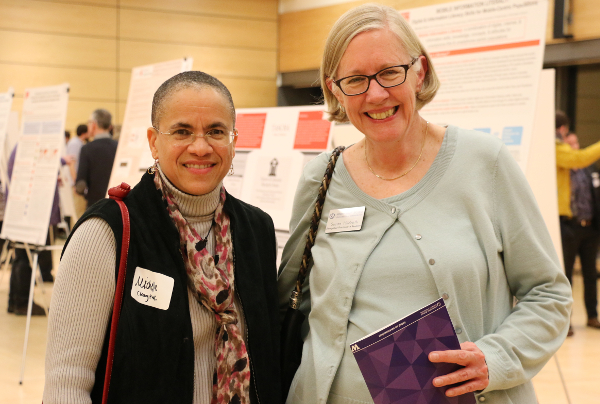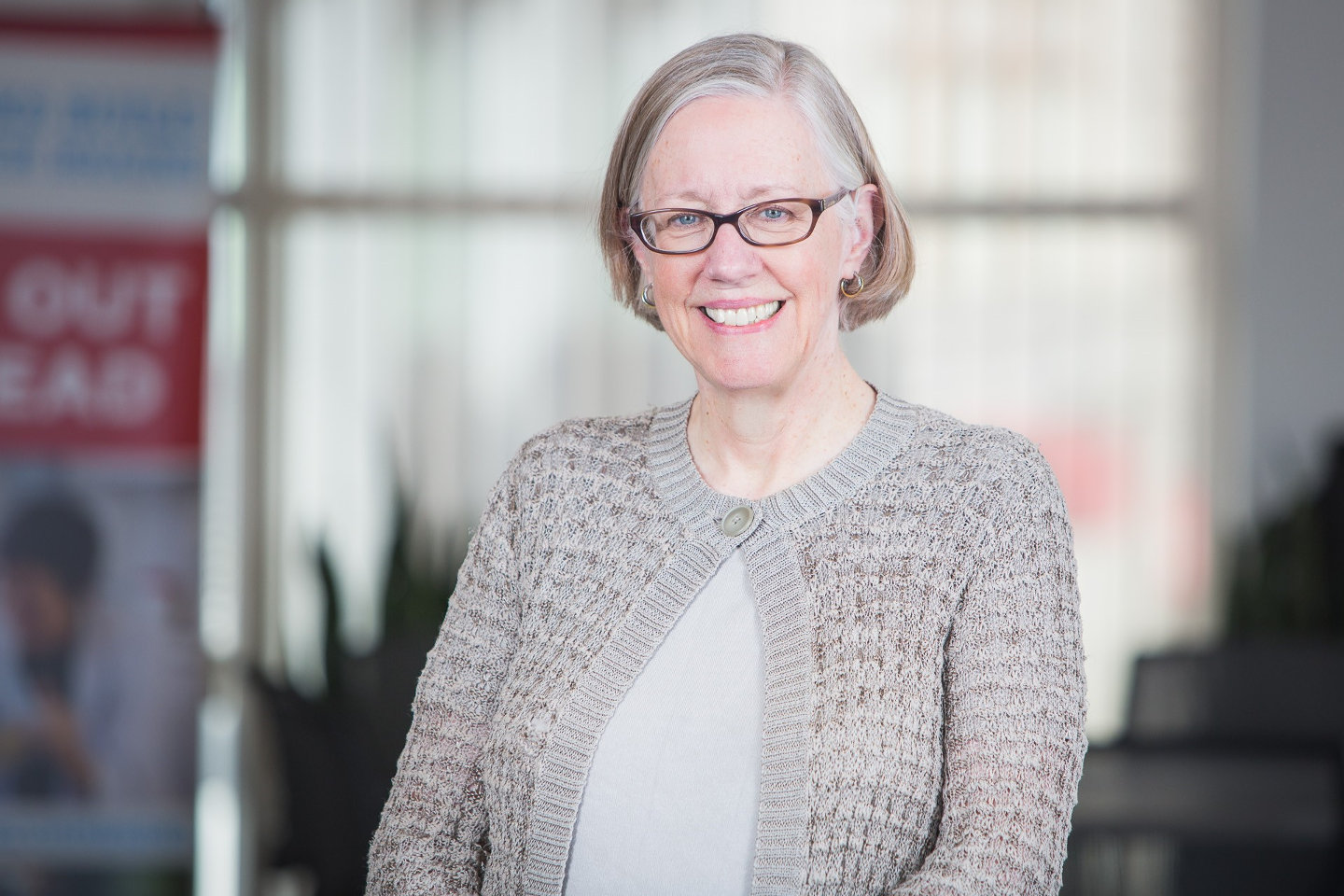High-profile library leader Susan Hildreth has seen the role of the public library – and the public librarian – change dramatically in the digital age. No longer just brick-and-mortar book-lending institutions, these 21st-century libraries are becoming community hubs that offer everything from free-access computer labs to in-depth instruction on sorting fake news from real.
“There’s a key shift from librarians being gatekeepers and dispensers of information to becoming facilitators and coaches and educators who are helping community members understand the skills they need to navigate this information flow that’s coming from everywhere,” says Hildreth, the iSchool’s first Distinguished Practitioner in Residence, focused on the future of public libraries.
The two-year position, funded with a $1.4 million grant from the Bill & Melinda Gates Foundation, is designed to bring practical, boots-on-the-ground perspectives to scholarly pursuits in library and information sciences at the school. It’s a model that the foundation and Hildreth hope will be adopted by other information schools across the country.
Hildreth sees the position as an opportunity to translate her work in the trenches into advice and guidance and to align university curriculum with real-world needs. “In training librarians, it is critical to continue to have that engagement with the field,” says Hildreth. “We have to keep in mind this balance between theory and practice. It’s a challenge to find that right balance, but it’s something we need to think about all the time.”
She came to the iSchool in 2016, bringing with her a wealth of expertise. As director of the Institute of Museum and Library Services in Washington, D.C., from 2011-15, she managed a $250 million annual budget and oversaw nearly $1 billion in support to public libraries and museums. She compares the job to that of a business CEO. “I moved from running a business to the academic world of idea-sharing and reflection,” says Hildreth, who holds graduate degrees in both children’s literature and business administration. Her impressive resume also includes stints as California state librarian, Seattle city librarian, and San Francisco city librarian. She is currently treasurer of the American Library Association.
What the accomplished administrator did not bring with her to the iSchool was teaching experience. Her expertise was in running boardrooms, not classrooms. “Getting up to speed on teaching – that was a big learning curve,” she says. “I’m still learning every day.”

One iSchool faculty member who took Hildreth under her wing was Helene Williams, senior lecturer in the Master of Library and Information Science (MLIS) program. Williams found Hildreth eager to master best teaching practices. “She was an avid learner, asking good questions, and very aware of the practical outcomes that our students need in order to secure jobs. Her wealth of experience in library and non-profit management brought valuable depth to our curriculum.”
Hildreth’s curriculum has covered everything from library management, her first course, to community engagement, a class she developed as part of the job’s requirements. To help ground course content, she has brought in experts from throughout the library world as guest lecturers. “I’ve been able to access some of the leading thinkers – and also doers – and bring them into the classroom,” she says. “We’re able to hear from the best and the brightest.”
As part of the professor of practice role, Hildreth is required to create a special project. Hers will examine the gaps between the MLIS curriculum and the needs of actual library employers, using a survey that identifies the skills most useful in today’s public libraries – skills such as the ability to work with difficult patrons and competency in evaluating information sources.
“I have heard library employers decry the misalignment of the field and the academy often during my career,” says Hildreth, who is convening two day-and-a-half workshops this spring to allow faculty, students, and library employers to dive into the topic. Data gathered during the sessions will be used in the iSchool’s MLIS curriculum review.
Increasing public libraries’ community engagement has been a major focus for Hildreth throughout her long career. She has pushed librarians to get out into their communities and listen deeply to local needs, using that input to guide creation of programs and services. “We’ve really turned from an inward-looking approach to an outward-looking approach.”
The list of community-focused initiatives she has influenced is long. In her D.C. role at the Institute of Museum and Library Services (IMLS), she oversaw significant investments in early learning, a longtime passion of hers. She was also an early and strong supporter of free broadband access for public libraries, including those in rural and under-resourced areas. She helped push for creation of digital media learning labs across the country. During her tenure, the IMLS worked with federal partners to set up library programs to help patrons with financial literacy and paths to citizenship.
Among community programs launched by her team at the California State Library was one called Get Involved. It drew in aging Baby Boomers eager to volunteer at public libraries and share their expertise in fields such as marketing or fundraising. “Before, volunteering meant book-mending, book sales, building bookshelves. But these highly skilled professionals wanted to use their skills to build new programs,” says Hildreth.
She has also been a strong proponent of setting up communal makerspaces inside public libraries – rooms supplied with gear such as 3-D printers, software, electronics, craft supplies, sewing machines – everything people need to get creative and collaborate on projects and ideas. “The prevalence of makerspaces in libraries today is just amazing,” says Hildreth.
Her two-year term at the iSchool ends this June, when she will return to her home in Walnut Creek, California, to “take it easy.” She will be succeeded by Rolf Hapel, Director of Citizens’ Services and Libraries in Aarhus, Denmark. Hapel, like Hildreth, is known for pushing innovation and community connection in public libraries. He will serve until 2020. A search is already under way for a successor to Hapel.
“The foundation wants to ensure that individuals who serve in this program have deep expertise in the library field, have made significant contributions to the field, and also have national or international visibility,” says Hildreth.
She hit every checkmark. “We have been extremely lucky to have Susan Hildreth as our inaugural Distinguished Practitioner in Residence at the iSchool,” says iSchool MLIS program chair Jin Ha Lee. “She has not only been an excellent instructor and mentor for our students but also helped us set a future direction for the program through her active participation in the program and admissions committees. I honestly do not think we could have had a more perfect person for this influential position and she has certainly set a high bar for it going forward.”
For Hildreth, the most challenging part of the position – teaching – has also proved the most inspiring. “The big reward for me has been working with the students. The students here at the iSchool all have different goals, but they all want to make a difference in their community. They are absolutely dedicated to social justice. And that has to be a lens that is used in everything we teach, because our students are demanding it.”
